Do you feel like you never have enough time in the day? Are you struggling to get everything done, and feeling overwhelmed? If so, you’re not alone.
In this blog post, we will discuss some time management tips that can help you increase your productivity. Implementing time management tips will help make your days more organized and stress-free!
Chapters
Filters
Chapter 1
Time Management
Why is Time Management Important?
Time management is important because it allows you to control how you spend and manage your time, rather than letting time control you. When you manage time effectively, you can get more done in less time & plan ahead, which leaves you with more time to do the things you enjoy.
Chapter 2
Time Management Key Stats
Project Time Management Key Stats
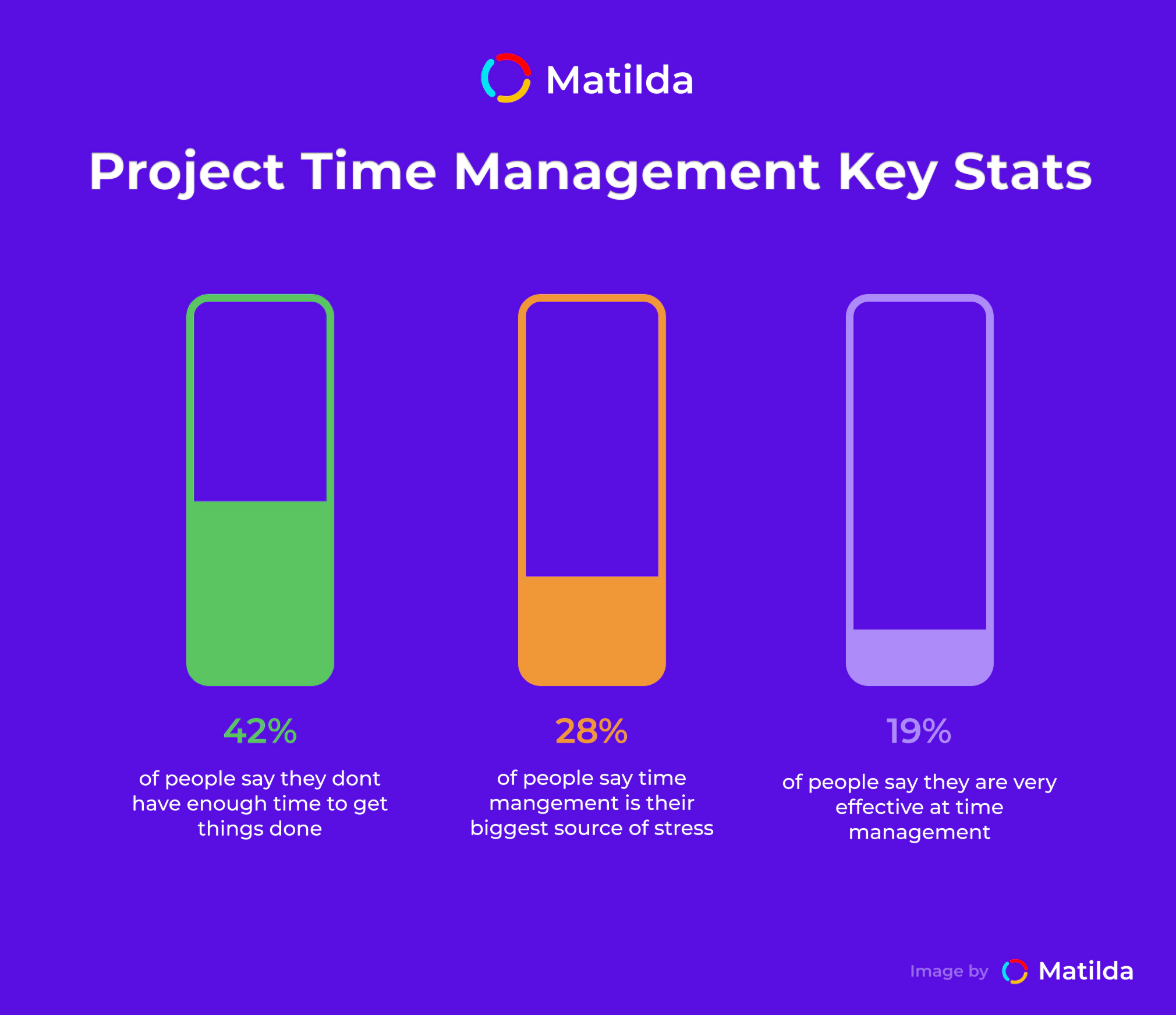 Here are some key stats about time management:
Here are some key stats about time management:
• The average person spends about one-third of their day engaged in some form of time management activities.
• 42% of people say that they never have enough time to get everything done.
• 28% of people say that time management is their biggest source of stress.
• Only 19% of people feel that they are very effective at time management.
There are some things you can do to improve your time management skills. So keep at it and you’ll eventually get the hang of it!
Chapter 3
Time Management Techniques
1. Start your day with a Plan
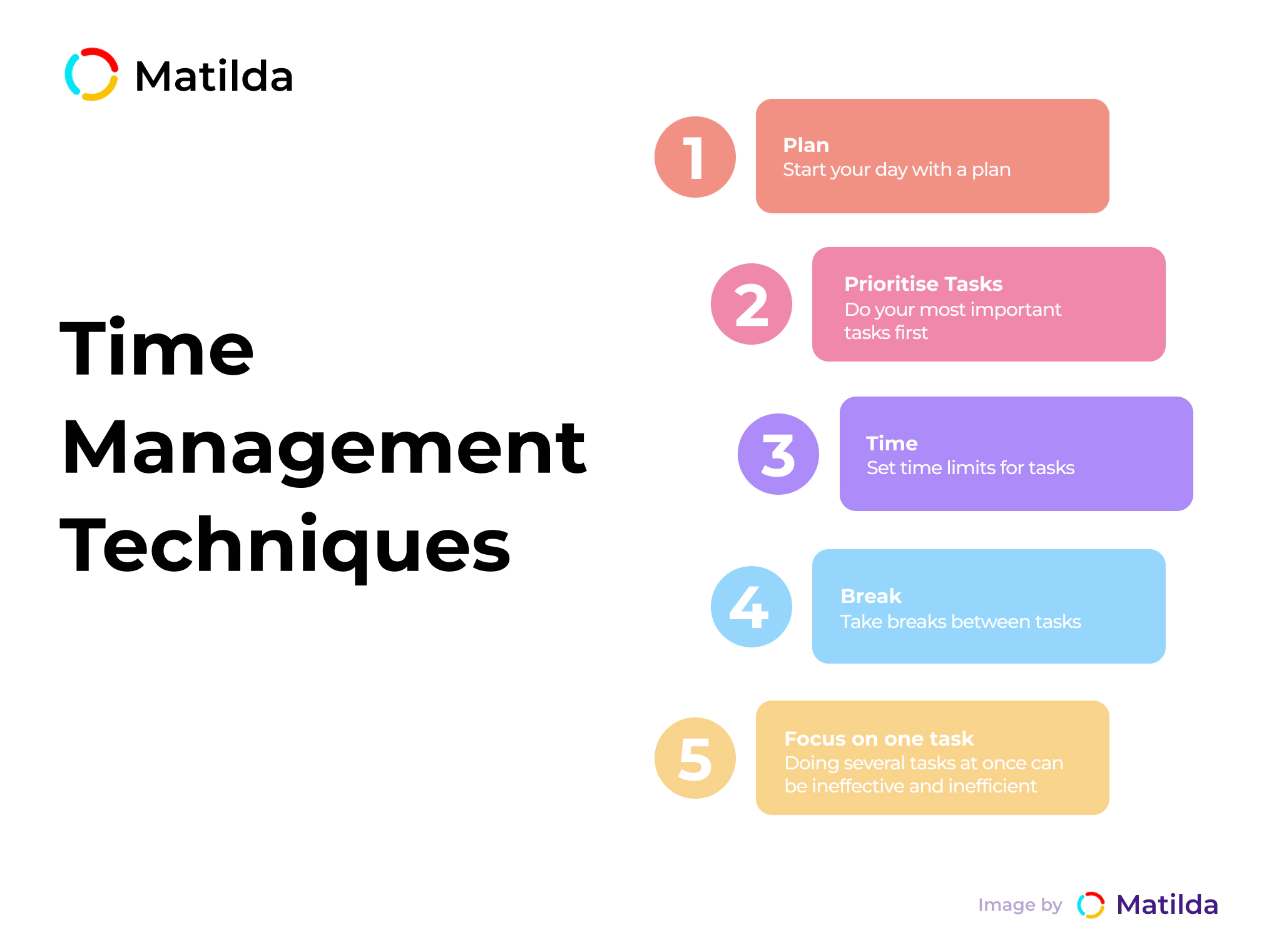 Starting your day with a plan can help you manage your time more effectively and stay focused on your work. Of course, making a plan is only half the battle.The other half is sticking to it! But if you can plan ahead & discipline yourself to stick to your plan, you’ll find that you’re much more productive throughout the day.
Starting your day with a plan can help you manage your time more effectively and stay focused on your work. Of course, making a plan is only half the battle.The other half is sticking to it! But if you can plan ahead & discipline yourself to stick to your plan, you’ll find that you’re much more productive throughout the day.
2. Practice Time Blocking
Time blocking is a good way to manage time and get more done in a day. It involves setting aside certain blocks of time for certain tasks. For example, you might set aside an hour for work and an hour for enough sleep.By breaking up your day into manageable chunks, you can make sure that you’re getting the most out of your time.
3. Prioritize tasks based on Importance and Urgency
As anyone who has ever tried to get through a to-do list knows, not all tasks are created equal. Some tasks are urgent and important, while others are neither urgent nor important.
A good rule of thumb is to ask yourself whether the work is necessary for your long-term goals and prioritize accordingly.
4. Make use of the Project Management tools available online
If you’re looking for a way to increase your productivity, look no further than a project management tool. Keeping track of your to do list, deadlines, goals, and project management tools can help you to stay on focused work & track time.
There are a variety of project management tools available online, so there’s sure to be one that’s a perfect fit for you and your needs.
5. Lessen the Distractions around you
Minimizing distractions is essential for being productive. One way to do this is to identify the activities that tend to disrupt your workflow.A good place to start is by eliminating your personal time-wasters. Turn off messaging notifications and leave your personal phone calls for lunch.
6. Divide larger Projects into Smaller Tasks
The key to managing your time on large projects is to break them down into smaller tasks of related work. By chunking the project down, you can better concentrate on each individual piece.
7. Set a time limit to complete a task
People who like to keep track of things they do are usually focused, productive, and organized.They not only monitor and track the hours they work but are also mindful of the number of activities they perform, tasks and projects they manage, and clients they work for.
8. Remove non-essential tasks and focus on the important ones
It’s important to remove excess activities or to do lists from your life so that you can focus on what is truly significant.
Determine what is important to you and what deserves your time. Removing non-essential tasks/activities frees up more of your time to be spent on things that matter.
9. Take breaks between Tasks
Trying to stay concentrated throughout the day can be a challenge, especially when you have a lot on your plate. Your mind is like a muscle: it gets tired after extended use and needs some time to rest.
That’s why it’s important to allow yourself some downtime between tasks.
10. Focus on one task at a time
While some praise multitasking, it appears to make more harm than good. Doing several tasks at once can be ineffective and inefficient.Instead, try to concentrate on one work at a time and complete it, and after that switch to another one.
11. Limit Multi-Tasking
As the human brain needs time to switch from one work to another, trying too many things creates a lag time when we’re actually not being as productive as we might want to be.So instead of trying too many things at once, concentrate on one work and complete it before moving on to another.
12. Determine your Productive Hours
Are you a morning person or a night owl? Depending on when you feel most awake and alert, schedule your more important tasks during those hours.If you have the option to set your own hours, consider starting your day a bit later so that you can work when you’re feeling more refreshed.
13. Use Pomodoro Technique
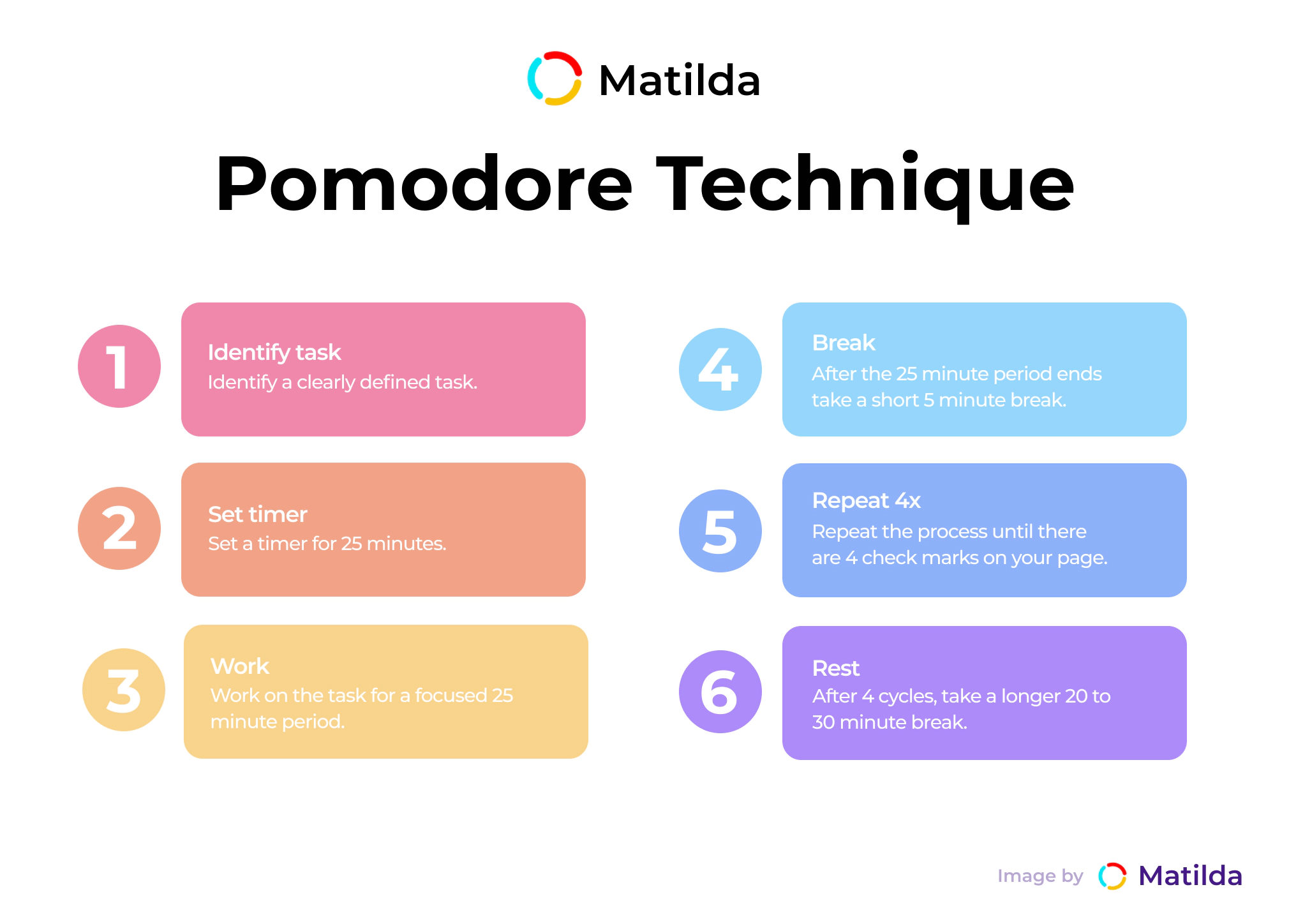 The Pomodoro technique is a time management strategy that breaks down work into 25-minute intervals, separated by short breaks. After four intervals, there is a longer break of 15-20 minutes.
The Pomodoro technique is a time management strategy that breaks down work into 25-minute intervals, separated by short breaks. After four intervals, there is a longer break of 15-20 minutes.
This technique can help you to stay focused and avoid burnout by taking regular breaks, for example, a short walk.
Pro Tip
14. Use your Calendar and Notepad
One of the best ways to stay on top of your time management is to keep a calendar and notepad with you at all times.By keeping a calendar and notepad with you, you can ensure that you won’t forget any important tasks and that you’ll always have a record of what needs to be done. This can be one of the incredible & helpful time management tools.
15. Follow the 80/20 Rule
 The 80/20 rule, also known as the Pareto principle, is the idea that 80% of the effects come from 20% of the causes. In terms of good time management skills, this means that 80% of your results will come from 20% of your efforts.
The 80/20 rule, also known as the Pareto principle, is the idea that 80% of the effects come from 20% of the causes. In terms of good time management skills, this means that 80% of your results will come from 20% of your efforts.
So instead of trying to do everything, concentrate on the related tasks that will have the biggest impact.
16. Set Shorter but realistic Deadlines
If you find that you’re always putting off tasks until the last minute, try setting shorter but realistic deadlines for yourself. This way, you’ll have a sense of urgency to complete the work but you won’t be putting unnecessary pressure on yourself.
By setting a deadline, you’re telling yourself that you need to complete the work by a certain time.
17. Track your Time
One of the best ways to improve your time management is to track how you spend your time. One of the simplest ways is to keep a time log.To do this, all you need to do is write down what you’re doing and how long you’re doing it for. At the end of the day, you can then look at your time log and see where you might be able to save time.
Pro Tip
18. Don't put too much pressure on finishing the tasks
While it’s important to have a sense of urgency, you don’t want to put too much pressure on yourself to finish tasks.So instead of putting pressure on yourself, try to concentrate on taking one step at a time. Next tip, by breaking the task down into smaller steps, you can avoid feeling overwhelmed and stressed.
Note
19. Set goals that you what to achieve for the day
By having a clear goal in mind, you’ll be more focused and motivated to complete the tasks that will help you to reach that goal.You can also use your goals to help you schedule & prioritize your time. If you have a goal that’s time-sensitive, you’ll need to make sure that you focus on the tasks that will help you to reach that goal in life.
20. Create new routines and then turn them into Habits
Are you looking to create some new routines and turn them into habits? Well, apple calendar is here to help! Just Add different tasks you want to do each day and make sure to check off each one as you complete it. Soon enough, you’ll have developed some great new habits that will improve your life!
Action Item
21. Manage your stress wisely to avoid burnout
We all know the feeling: You’re stressed out, your to-do list is a mile long, and you can’t possibly see how you’re going to get everything done. If this sounds familiar, you might be on the road to burnout in life.But don’t worry, First, make sure you’re taking some time for yourself every day.
Secondly, take a close look at your workload and see if there are any areas where you can lighten the load.
Finally, stay informed about your stress levels by keeping track of how you’re feeling on a daily basis. This can be as simple as jotting down a few insightful reports each day in a journal.
22. Spend your mornings doing the Most Important Tasks (MITs)
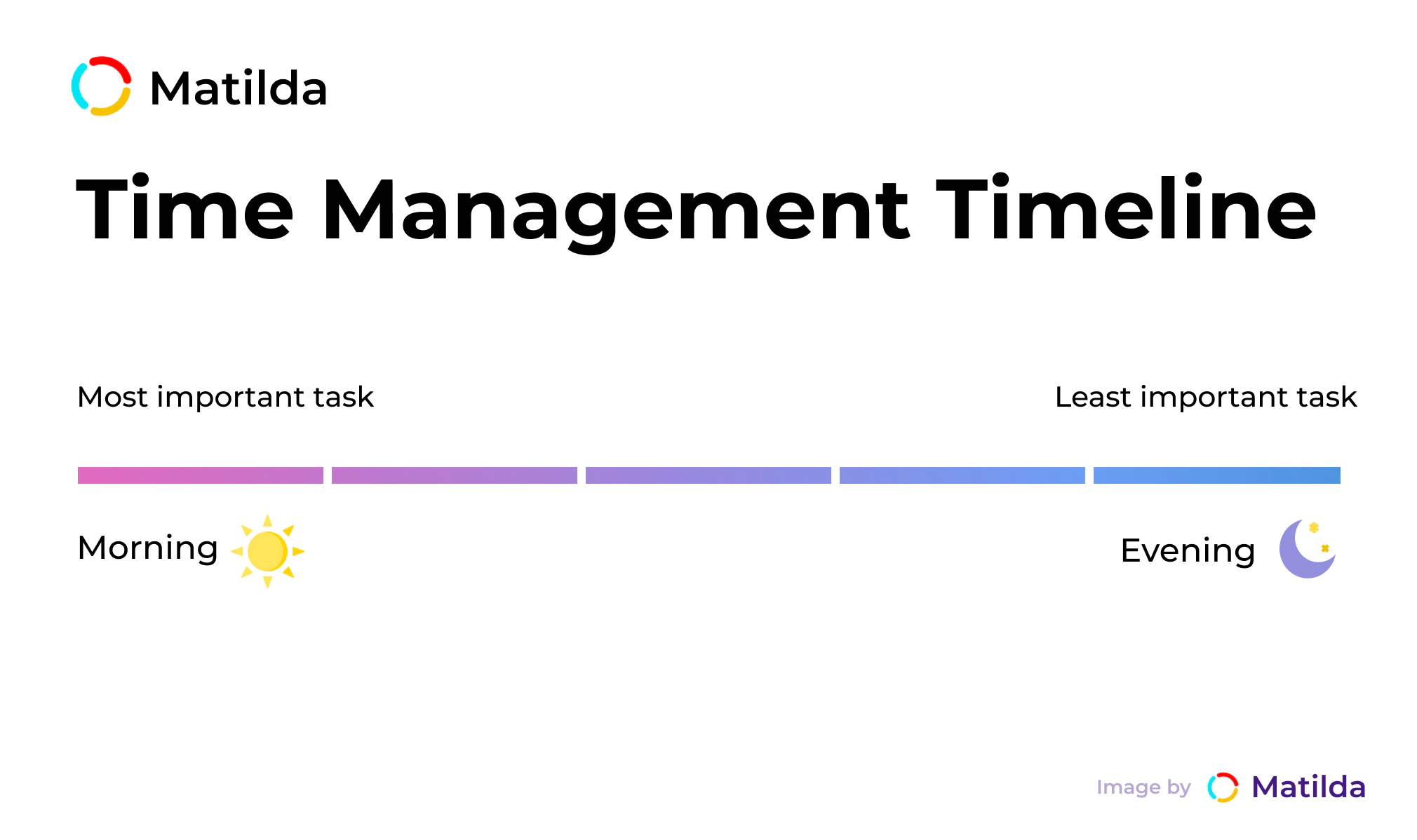 If you want to be like many high achievers, you need to start your day off right by doing the most important tasks first thing in the morning. That way, you’ll get it out of the way and you won’t have to worry about it for the rest of the day.
If you want to be like many high achievers, you need to start your day off right by doing the most important tasks first thing in the morning. That way, you’ll get it out of the way and you won’t have to worry about it for the rest of the day.
Mornings are tough, but if you can force yourself to get up and get going in life, you’ll be glad you did.
23. Learn to delegate and outsource
Trying to do everything yourself is not only exhausting, but it’s also a quick way to burn out. Additionally, it’s important to remember that you can’t be an expert at everything.
Delegating and outsourcing allow you to tap into additional resources and expertise that you might not have in-house. It can also be helpful for managing recurring events or tasks that need to be completed on a regular basis.
24. Leave a buffer-time between tasks and meetings
Whether you’re trying to get through daily tasks or preparing for a meeting, it’s important to use your time wisely. One way to do this is to leave a buffer time between tasks and meetings.
This time can be used to review materials, make last-minute preparations, or simply take a break. It can also help to ensure that you have an accurate picture of how much time each work will actually take.
25. Create a time audit
If you feel like you’re always short on time, it might be time to conduct a time audit. Keep track of everything you do for a day or two, and then take a close look at where your time is going.
Once you’ve identified how much time you’re actually spending, you can start to make changes for effective time management.
26. Set a time limit for each task
When it comes to time management tips, one of the best pieces of advice is to set a time limit for each task. This may sound counterintuitive at first but bear with me.
By setting time limits, you force yourself to focus on the task at hand and not get distracted by other things.
27. Eliminate Time Wasters
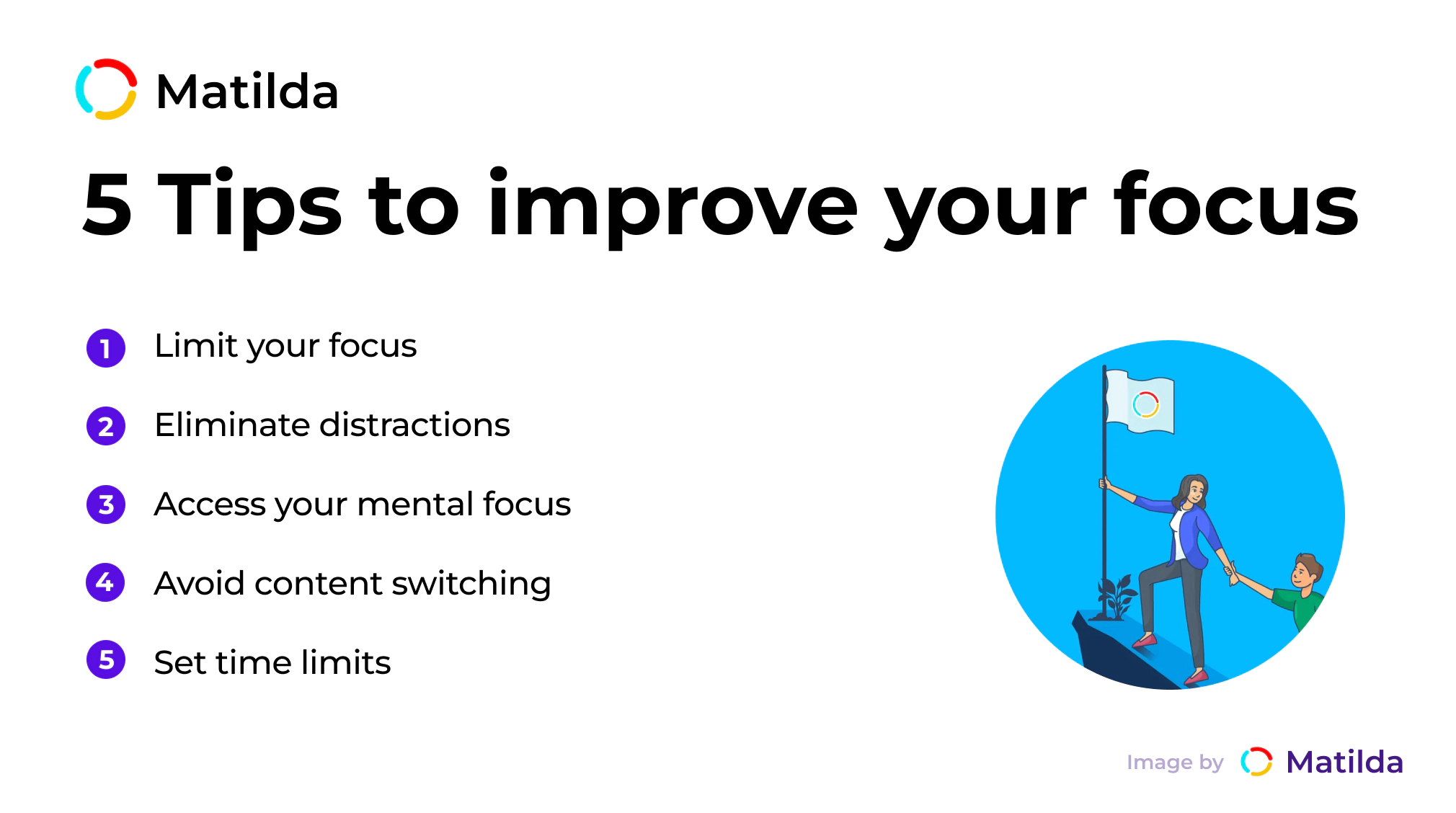 The most effective time tracking tool for time management is eliminating time wasters. To use your time effectively, start by identifying your own personal waste of time. Once you know what they are, you can start to take steps to eliminate them from your life.
The most effective time tracking tool for time management is eliminating time wasters. To use your time effectively, start by identifying your own personal waste of time. Once you know what they are, you can start to take steps to eliminate them from your life.
For example, if you find yourself spending too much time on social media, try setting a limit for yourself each day.
28. Video and phone calls not commuting
We’ve all been there. You’re in the middle of a commute, and you get a phone call or a video call. Do you answer it? It’s a tough decision to make.The best solution is to just not answer the phone or video call. Let it go to voicemails or send text messages saying that you’re busy. That way, you can avoid an awkward conversation and focus on getting to your destination.
29. Stop being perfect
There’s a fine line between being good at time management and being a perfectionist about it. If you find yourself getting stressed out about effective time management, it might be time to take a step back and relax.
Instead of trying to be perfect, focus on being good enough. You’ll still get things done and you’ll be much happier in the process.
30. Batch related tasks together
It can be tempting to try to multi-task, but studies have shown that this is actually less effective than focusing on a single task at a time. Instead of trying to do everything at once, schedule & create time blocks to batch similar tasks & stick to them.
For example, dedicate 30 minutes to answer emails, then move on to something else. You’ll be surprised at how much more productive you are when you focus on one thing at a time. And if you absolutely must have multiple devices open, try using a productivity app, for example, Freedom or Cold Turkey to block distractions.
31. Avoid context switching
As anyone who has ever tried to do two things at once knows, context switching is a recipe for disaster. When you’re trying to focus on one task, the last thing you want is to be interrupted by a notification from another task.For example, One way to avoid context switching is to use a google calendar. By setting aside specific blocks to schedule time for each task, you can minimize the temptation to switch contexts and stay focused on the task in life.
32. Learn to say no
There are only so many hours in the day, and often it feels like we’re wasting time saying yes to things we don’t really want to do. Whether it’s agreeing on spending time on a project that isn’t going anywhere, we can all benefit from learning to say no.There’s nothing wrong with saying no. If you’re wasting time on something that isn’t productive or important, then saying no can help you get back on track.
33. Don't worry about irrelevant details
If you’re spending too much time on the same task, ask yourself whether the details you’re obsessing over are actually relevant to the task at hand. chances are, they’re not.
So save yourself some time and focus on what’s actually important. And if you’re still not sure, just ask yourself one simple question: will this detail make a difference in the end? If the answer is no, then move on and don’t let it stress you out.
34. Time box activities
An online calendar is great for time boxing activities. They provide more value by allowing you to share them with others and track your progress.
Time boxing is a great way to make sure that you get the most out of your day. By setting aside a specific amount of time for an activity, you can make sure that you don’t spend time on things that aren’t important to you.
35. Have a clock visibly placed near you
Clocks are real time savers. By having a clock visibly placed near you, you can save yourself the trouble of having to search for a clock when you need to know what time it is.Of course, not all clocks are created equal. But regardless of its features, a clock is a useful fundamental tool that can help you to stay on schedule and make the most of your time.
Conclusion
By using time management techniques, you can increase your productivity, reduce stress, and get more done in less time.
What is your favorite time management tip? Share them in the comments below!




